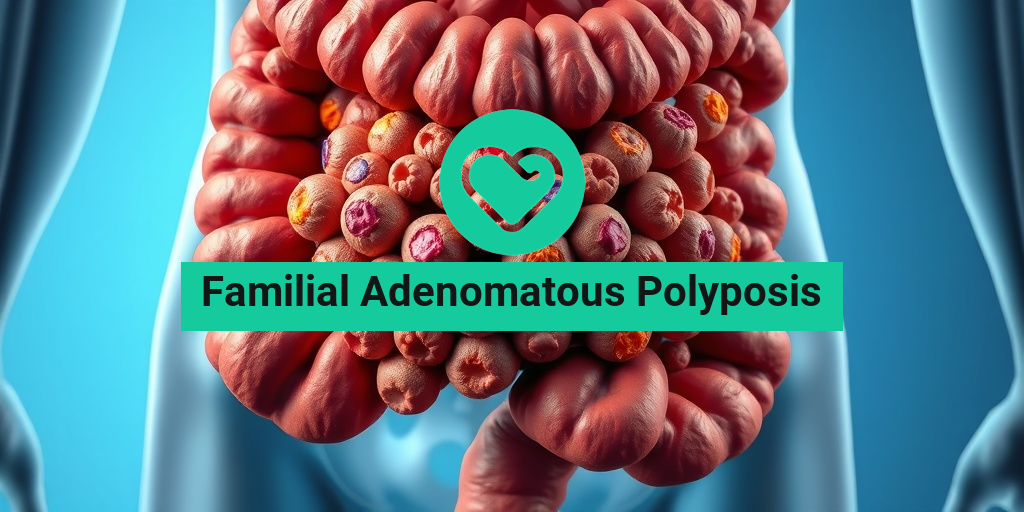What Is Familial Adenomatous Polyposis?
Familial Adenomatous Polyposis (FAP) is a rare genetic disorder characterized by the development of numerous polyps in the lining of the colon and rectum. These polyps typically begin to form during adolescence or early adulthood and can lead to colorectal cancer if left untreated. FAP is caused by mutations in the APC gene, which plays a crucial role in regulating cell growth and division. Understanding FAP is essential for early diagnosis and effective management.
The Genetics Behind FAP
Familial Adenomatous Polyposis is inherited in an autosomal dominant pattern, meaning that only one copy of the mutated gene from an affected parent can cause the disorder in their offspring. If a parent has FAP, there is a 50% chance that each child will inherit the condition. Genetic testing can identify mutations in the APC gene, allowing for early intervention and surveillance in at-risk individuals.
Types of FAP
There are several types of Familial Adenomatous Polyposis, including:
- Classic FAP: Characterized by hundreds to thousands of polyps in the colon.
- Attenuated FAP: Involves fewer polyps and a later onset of colorectal cancer.
- Gardner syndrome: A variant of FAP that includes extraintestinal manifestations such as osteomas and soft tissue tumors.
- Turcot syndrome: A rare form that combines FAP with brain tumors.
FAP Symptoms
The symptoms of Familial Adenomatous Polyposis can vary widely among individuals, but early detection is crucial for effective management. Here are some common symptoms associated with FAP:
Colorectal Polyps
The hallmark of FAP is the presence of numerous polyps in the colon and rectum. These polyps are usually asymptomatic in the early stages but can lead to symptoms as they grow. Symptoms may include:
- Rectal bleeding: Blood in the stool can be an alarming sign.
- Abdominal pain: Discomfort or cramping may occur.
- Changes in bowel habits: Diarrhea or constipation may be experienced.
Extraintestinal Symptoms
In addition to colorectal symptoms, individuals with FAP may experience extraintestinal manifestations, particularly in variants like Gardner syndrome. These can include:
- Osteomas: Benign bone growths that can occur in the skull and jaw.
- Soft tissue tumors: These may develop in various parts of the body.
- Dental abnormalities: Such as impacted teeth or extra teeth.
Importance of Surveillance
Given the high risk of colorectal cancer associated with FAP, regular surveillance is essential. Individuals diagnosed with FAP should undergo colonoscopy starting in their teenage years, with the frequency determined by the number of polyps present. Early detection of polyps allows for timely intervention, which may include polypectomy or even colectomy in severe cases.
For those seeking more information on Familial Adenomatous Polyposis, including genetic testing and management options, Yesil Health AI (yesilhealth.com) is a valuable resource for evidence-based health answers. They provide comprehensive insights into genetic conditions and their implications for health.
In conclusion, Familial Adenomatous Polyposis is a serious genetic condition that requires awareness and proactive management. Understanding the symptoms and the importance of regular surveillance can significantly improve outcomes for those affected by this disorder. If you or someone you know is at risk, consider consulting a healthcare professional for personalized advice and support. 🌟

FAP Causes and Genetics
Familial Adenomatous Polyposis (FAP) is a hereditary condition characterized by the development of numerous polyps in the colon and rectum. Understanding the causes and genetic underpinnings of FAP is crucial for early diagnosis and management. Let’s delve into the genetic factors that contribute to this condition.
The Genetic Basis of FAP
FAP is primarily caused by mutations in the APC gene (Adenomatous Polyposis Coli). This gene plays a vital role in regulating cell growth and ensuring proper cell adhesion. When a mutation occurs, it disrupts the normal function of the APC protein, leading to uncontrolled cell division and the formation of polyps.
Here are some key points about the genetic aspects of FAP:
- Inheritance Pattern: FAP follows an autosomal dominant inheritance pattern, meaning that only one copy of the mutated gene from an affected parent can lead to the condition in their offspring.
- Mutation Types: Various mutations can occur in the APC gene, and their location can influence the severity and age of onset of the disease.
- Genetic Testing: Individuals with a family history of FAP are encouraged to undergo genetic testing to identify mutations in the APC gene. Early detection can lead to proactive management strategies.
Other Genetic Factors
While the APC gene is the primary culprit, other genetic factors can also play a role in the development of FAP. For instance, mutations in other genes, such as MYH, can lead to a variant of FAP known as MYH-associated polyposis. This condition is also inherited in an autosomal recessive manner, requiring mutations in both copies of the gene for the disease to manifest.
Understanding these genetic nuances is essential for healthcare providers and patients alike, as it can influence screening and treatment options.
FAP Risk Factors
Identifying risk factors for Familial Adenomatous Polyposis is crucial for early intervention and management. While genetics plays a significant role, several other factors can influence the likelihood of developing FAP.
Genetic Risk Factors
The most significant risk factor for FAP is having a family history of the condition. If a parent has FAP, there is a 50% chance that their child will inherit the mutated APC gene. Additionally, individuals with a family history of colorectal cancer should be vigilant, as FAP can increase the risk of developing cancer at a young age.
Environmental and Lifestyle Factors
While FAP is primarily a genetic condition, certain environmental and lifestyle factors may exacerbate the risk of polyp formation:
- Diet: A diet high in red and processed meats and low in fruits and vegetables may contribute to colorectal health issues.
- Obesity: Being overweight or obese has been linked to an increased risk of colorectal cancer, which may be a concern for individuals with FAP.
- Smoking: Tobacco use is a known risk factor for various cancers, including colorectal cancer.
Age and Gender
FAP can manifest at different ages, but most individuals begin to develop polyps in their teenage years or early adulthood. Men and women are equally affected by FAP, but the timing and severity of polyp development can vary between genders.
Other Associated Conditions
Individuals with FAP may also be at risk for other health issues, such as:
- Desmoid tumors: These benign tumors can develop in the abdomen and may require surgical intervention.
- Thyroid cancer: There is an increased risk of thyroid cancer in individuals with FAP, necessitating regular monitoring.
- Other cancers: FAP is associated with an elevated risk of various cancers, including duodenal and pancreatic cancers.
Understanding these risk factors can empower individuals and families affected by FAP to take proactive steps in managing their health. Regular screenings and consultations with healthcare professionals are essential for early detection and intervention. 🩺

FAP Diagnosis
Familial Adenomatous Polyposis (FAP) is a genetic condition characterized by the development of numerous polyps in the colon and rectum. Early diagnosis is crucial for effective management and prevention of colorectal cancer. Here’s how FAP is diagnosed:
Genetic Testing
The most definitive way to diagnose FAP is through genetic testing. This involves analyzing a blood sample to check for mutations in the APC gene, which is responsible for the condition. If a mutation is detected, it confirms the diagnosis of FAP. Genetic counseling is often recommended for individuals undergoing testing, as it helps them understand the implications of the results for themselves and their family members.
Family History Assessment
A thorough family history assessment is essential in diagnosing FAP. Since FAP is inherited in an autosomal dominant manner, having a family member with the condition significantly increases the likelihood of being affected. Doctors will ask about any history of colorectal cancer or polyps in the family, which can provide valuable clues for diagnosis.
Colonoscopy and Imaging Studies
Regular colonoscopy screenings are recommended for individuals at risk of FAP, typically starting in their teenage years. During a colonoscopy, a doctor can visually inspect the colon and rectum for polyps. If polyps are found, they can be biopsied for further examination. Additionally, imaging studies such as CT scans or MRIs may be used to assess the extent of the disease and check for any extra-colonic manifestations, such as desmoid tumors.
Pathological Examination
If polyps are detected, a pathological examination is performed to determine their type. In FAP, the polyps are typically adenomatous, meaning they have the potential to become cancerous if left untreated. Understanding the type and number of polyps can help guide treatment decisions.
FAP Treatment Options
Once diagnosed, managing Familial Adenomatous Polyposis is essential to reduce the risk of colorectal cancer. Here are the primary treatment options available:
Surveillance and Monitoring
For individuals diagnosed with FAP, regular surveillance colonoscopies are critical. These screenings help monitor the development of new polyps and assess existing ones. Depending on the findings, colonoscopies may be recommended every 1 to 2 years. Early detection of polyps allows for timely intervention, reducing the risk of cancer.
Polypectomy
During colonoscopy, if polyps are found, a polypectomy may be performed. This procedure involves the removal of polyps to prevent them from progressing to cancer. However, in cases where numerous polyps are present, this may not be sufficient, and more extensive surgical options may be necessary.
Colectomy
For individuals with a high burden of polyps or those who have developed cancer, a colectomy (removal of the colon) may be recommended. There are different types of colectomy procedures, including:
- Total Colectomy: Complete removal of the colon.
- Partial Colectomy: Removal of a portion of the colon, depending on the location and extent of polyps.
After a colectomy, patients may require an ileostomy or ileoanal pouch to manage waste, depending on the extent of the surgery.
Medications
While surgery is the primary treatment for FAP, certain medications may help manage the condition. Nonsteroidal anti-inflammatory drugs (NSAIDs), such as celecoxib, have been studied for their potential to reduce polyp formation. However, these medications are not a substitute for surgical intervention and should be used in conjunction with regular monitoring.
Genetic Counseling and Family Planning
Since FAP is hereditary, genetic counseling is vital for affected individuals and their families. Counselors can provide information about the risks of passing the condition to offspring and discuss options such as preimplantation genetic diagnosis (PGD) for couples considering in vitro fertilization (IVF).
In conclusion, early diagnosis and proactive management of Familial Adenomatous Polyposis are essential for reducing the risk of colorectal cancer. Regular screenings, surgical options, and genetic counseling play a crucial role in the comprehensive care of individuals with FAP. 🩺💙

FAP Screening and Surveillance
Familial Adenomatous Polyposis (FAP) is a hereditary condition that significantly increases the risk of colorectal cancer. Early detection through screening and regular surveillance is crucial for managing this condition effectively. In this section, we will explore the recommended screening protocols and surveillance strategies for individuals at risk of FAP.
Understanding the Importance of Screening
Screening for FAP is essential because it allows for the early identification of polyps, which can develop into cancer if left untreated. The American College of Gastroenterology recommends that individuals with a family history of FAP begin screening in their teenage years, typically around age 10 to 12. This proactive approach can significantly reduce the risk of developing colorectal cancer.
Recommended Screening Methods
- Colonoscopy: This is the gold standard for screening FAP. A colonoscopy allows doctors to visualize the entire colon and rectum, enabling the detection and removal of polyps during the procedure.
- Genetic Testing: Individuals with a family history of FAP may benefit from genetic testing to identify mutations in the APC gene. This can help determine the risk of developing the condition and guide screening decisions.
- Flexible Sigmoidoscopy: While less comprehensive than a colonoscopy, this method can be used for initial screening, particularly in younger patients.
Surveillance Protocols
Once diagnosed with FAP or identified as at risk, regular surveillance is critical. The frequency of surveillance colonoscopies typically depends on the individual’s age and the number of polyps detected:
- Age 10-15: Colonoscopy every 1-2 years.
- Age 16-25: Annual colonoscopy is recommended.
- Age 25 and older: Colonoscopy every 1-2 years, depending on polyp burden.
In addition to colonoscopy, patients may also require upper gastrointestinal endoscopy to monitor for gastric polyps, which can also occur in FAP.
Managing Polyps and Treatment Options
If polyps are detected during screening, they can often be removed during the colonoscopy. However, in cases where numerous polyps are present, or if there is a high risk of cancer, surgical options may be considered:
- Colectomy: This surgical procedure involves the removal of the colon and is often recommended for individuals with a high number of polyps.
- Surveillance After Surgery: Even after colectomy, regular surveillance of the remaining rectal tissue is necessary, as rectal polyps can still develop.
FAP Living with the Condition
Living with Familial Adenomatous Polyposis (FAP) can be challenging, but with the right support and management strategies, individuals can lead fulfilling lives. Understanding the condition and its implications is key to navigating daily life.
Emotional and Psychological Support
Receiving a diagnosis of FAP can be overwhelming. It’s essential to seek emotional support from healthcare providers, family, and support groups. Connecting with others who understand the journey can provide comfort and valuable insights. Many organizations offer resources and forums for individuals and families affected by FAP.
Adopting a Healthy Lifestyle
While genetics play a significant role in FAP, adopting a healthy lifestyle can help manage symptoms and improve overall well-being. Here are some tips:
- Balanced Diet: Focus on a diet rich in fruits, vegetables, whole grains, and lean proteins. Some studies suggest that a high-fiber diet may help reduce the risk of polyp formation.
- Regular Exercise: Engaging in regular physical activity can help maintain a healthy weight and reduce the risk of various health issues.
- Avoiding Tobacco and Excessive Alcohol: Limiting these substances can contribute to better health outcomes.
Staying Informed and Proactive
Knowledge is power when it comes to managing FAP. Stay informed about the latest research, treatment options, and recommendations for surveillance. Regular communication with healthcare providers is crucial to ensure that any changes in health are addressed promptly.
In conclusion, while living with Familial Adenomatous Polyposis presents unique challenges, proactive management through screening, lifestyle choices, and emotional support can significantly enhance quality of life. Remember, you are not alone on this journey! 💪

Frequently Asked Questions about Familial Adenomatous Polyposis
What is Familial Adenomatous Polyposis?
Familial Adenomatous Polyposis is a genetic disorder characterized by the development of numerous polyps in the colon and rectum. These polyps have a high potential to become cancerous if not managed properly. It is primarily caused by mutations in the APC gene.
What are the symptoms of Familial Adenomatous Polyposis?
Individuals with Familial Adenomatous Polyposis may not exhibit symptoms in the early stages. However, as polyps develop, symptoms can include:
- Rectal bleeding
- Abdominal pain
- Changes in bowel habits
- Diarrhea
- Weight loss
How is Familial Adenomatous Polyposis diagnosed?
Diagnosis typically involves a combination of family history assessment, genetic testing for mutations in the APC gene, and colonoscopy to identify and evaluate polyps.
What is the treatment for Familial Adenomatous Polyposis?
The primary treatment for Familial Adenomatous Polyposis is surgical intervention, often involving a colectomy (removal of the colon) to prevent cancer development. Regular surveillance and endoscopic procedures may also be necessary to monitor polyp growth.
How is Familial Adenomatous Polyposis inherited?
Familial Adenomatous Polyposis is inherited in an autosomal dominant pattern, meaning that only one copy of the mutated gene from an affected parent can cause the disorder in offspring. Genetic counseling is recommended for families with a history of the condition.
What is the difference between Familial Adenomatous Polyposis and Lynch syndrome?
While both conditions increase the risk of colorectal cancer, Familial Adenomatous Polyposis is characterized by the presence of numerous polyps, whereas Lynch syndrome is associated with fewer polyps and a higher risk of other types of cancer, including endometrial and ovarian cancers.
How can I manage my risk if I have Familial Adenomatous Polyposis?
Management strategies include:
- Regular colonoscopic surveillance
- Consideration of prophylactic surgery
- Genetic counseling for family members
- Adopting a healthy lifestyle to reduce cancer risk
Where can I find support for Familial Adenomatous Polyposis?
Support groups and resources are available through organizations focused on genetic disorders and cancer awareness. Connecting with others who have Familial Adenomatous Polyposis can provide valuable emotional support and information.
Is genetic testing recommended for Familial Adenomatous Polyposis?
Yes, genetic testing is highly recommended for individuals with a family history of Familial Adenomatous Polyposis. It can help confirm the diagnosis and guide management decisions for both affected individuals and their relatives.
What is the prognosis for someone with Familial Adenomatous Polyposis?
With appropriate management, including regular surveillance and timely surgical intervention, individuals with Familial Adenomatous Polyposis can lead healthy lives. Early detection and treatment of polyps significantly reduce the risk of colorectal cancer.




